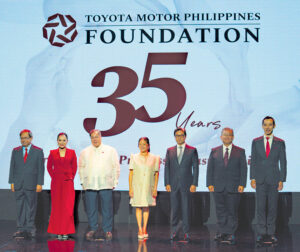THIRTY-FIVE YEARS of doing good is something worth celebrating. And there’s no better way to mark it than by finding even more ways to be of service to others. Toyota Motor Philippines Foundation (TMP Foundation), the “social and humanitarian arm” of Toyota Motor Philippines Corp. (TMP), works across four areas: education, health, environment, and community service.
Looking back at 35 years of “dedicated social and humanitarian service” with an event at the Grand Hyatt Hotel in Bonifacio Global City attended by public officials and private partners, TMP Foundation also took the opportunity to announce the addition of a new advocacy pillar, “Mobility+.”
“In synergy with our existing four pillars, this will enable us to create even more effective programs through the mobility of people, mobility of things, mobility of information, and mobility of creative and free ideas for many people,” said TMP and TMP Foundation Chairman Alfred V. Ty.
Late Metrobank Group and TMP Founding Chairman Dr. George SK Ty established the foundation to “give back to society and the communities from which (the group derives) resources.” Explained the younger Ty: “This vision was not merely an aspiration; it was a profound understanding of TMP’s role within the community — to improve the lives of our society, to contribute to a more equitable future for them.”
Mobility+ will now allow the foundation to expand its attention to the need for mobility and access — particularly to and for health professionals and the underserved segment of the populace they seek to treat or see. Spearheading the foray into the new area is the Healthcare Mobility for All (or HEAL) Project, led by Japan’s Toyota Mobility Foundation and undertaken with the Philippine General Hospital (PGH). The memorandum of understanding among the three parties was formally signed at the anniversary event.
The HEAL Project is envisioned to “address critical mobility needs and improve access to basic healthcare services in underserved communities,” to be achieved with the deployment of two Toyota Coaster-platformed mobile clinics to deliver essential medical laboratory services directly to patients in the pilot area Cavite (particularly Ternate), and the fielding of three units of the Tamaraw Utility Vans exclusively for healthcare workers traveling to and from PGH.
“The clinics will be integrated into the existing PGH IT systems that enable online consultation booking and will potentially be supported by a new queueing system to ensure efficient operations. This solution aims to optimize the time to do simple diagnosis and treatment for patients in these areas,” said TMP Mobility Foundation in a statement.
PGH Director-General Dr. Gerardo Legaspi revealed during the Q&A session at the event that the facility sees around 707,000 patients a year. “Around 30% of patients come from CALABARZON — and a majority of these patients come from Cavite. In the data that we have in the outpatient department, surprisingly, (many patients) still go for hypertension, diabetes, urinary tract infection consults. If we’re able to bring these services to the communities, you can imagine how many patients will be spared a trip to Manila.”
Speaking to members of the media after the event, TMF Program General Manager Nanako Kumamoto shared that the two mobile clinics and all the equipment therein will be turned over to PGH healthcare personnel for deployment in September. The shuttles, also to be fielded in September, meet a vital need for those commuting during nighttime or early morning when safety is a very real consideration.
TMP Foundation said that “this solution offers a more coordinated and comfortable way to travel to and from the hospital, reducing reliance on multiple public transportation transfers and minimizing safety concerns, commuting expenses and through pooling, and therefore cutting carbon emissions.”
The HEAL Project is potentially another feather in the cap for Toyota Motor Philippines, TMF Executive Program Director Pras Ganesh revealed in his response to this writer’s question. “This is the first location that we’re doing it within the Asia region,” he said, and likened it to the deployment of Toyota units for the use of healthcare workers during the time of the COVID-19 pandemic.
“(The) solution that we prepared here in the Philippines (was) replicated in Thailand, Indonesia, and India as well. So the issue of providing access to healthcare is a common issue, unfortunately across the region, and just as we did during the time of COVID-19, by creating this kind of a system, creating the program, creating the methodology, we could share it to other countries as well,” he concluded.

